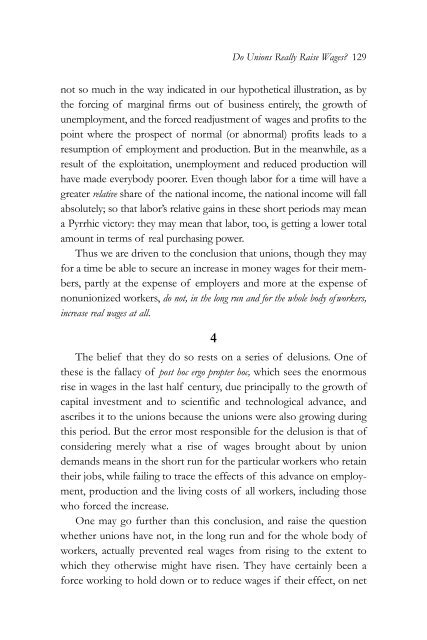1gDdM7w
1gDdM7w
1gDdM7w
- No tags were found...
Create successful ePaper yourself
Turn your PDF publications into a flip-book with our unique Google optimized e-Paper software.
Do Unions Really Raise Wages? 129not so much in the way indicated in our hypothetical illustration, as bythe forcing of marginal firms out of business entirely, the growth ofunemployment, and the forced readjustment of wages and profits to thepoint where the prospect of normal (or abnormal) profits leads to aresumption of employment and production. But in the meanwhile, as aresult of the exploitation, unemployment and reduced production willhave made everybody poorer. Even though labor for a time will have agreater relative share of the national income, the national income will fallabsolutely; so that labor’s relative gains in these short periods may meana Pyrrhic victory: they may mean that labor, too, is getting a lower totalamount in terms of real purchasing power.Thus we are driven to the conclusion that unions, though they mayfor a time be able to secure an increase in money wages for their members,partly at the expense of employers and more at the expense ofnonunionized workers, do not, in the long run and for the whole body ofworkers,increase real wages at all.4The belief that they do so rests on a series of delusions. One ofthese is the fallacy of post hoc ergo propter hoc, which sees the enormousrise in wages in the last half century, due principally to the growth ofcapital investment and to scientific and technological advance, andascribes it to the unions because the unions were also growing duringthis period. But the error most responsible for the delusion is that ofconsidering merely what a rise of wages brought about by uniondemands means in the short run for the particular workers who retaintheir jobs, while failing to trace the effects of this advance on employment,production and the living costs of all workers, including thosewho forced the increase.One may go further than this conclusion, and raise the questionwhether unions have not, in the long run and for the whole body ofworkers, actually prevented real wages from rising to the extent towhich they otherwise might have risen. They have certainly been aforce working to hold down or to reduce wages if their effect, on net


